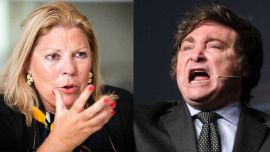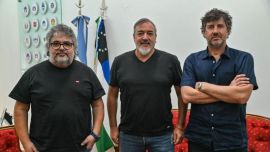Things have not been turning out as Cristina Fernández de Kirchner expected, starting with the electoral year.
In last year’s PASO primaries, Frente de Todos lost by over nine percentage points nationwide while crashing to defeat in their Buenos Aires Province stronghold. These were followed by a letter in which (according to her account) Cristina felt obliged to confront the president in public, leading to tense Cabinet changes at both national and provincial level.
The midterms did not turn out well either, although the ruling coalition did manage to narrow the differences from the primaries.
Even the “festive” atmosphere that improvement triggered in Peronism was eyed askance, not only by the opposition but also by Cristina herself – neither of them could understand what there was to celebrate. For Cristina’s followers, who decided to join the government’s subsequent march in Plaza de Mayo at the very last minute (not even arriving in time for the presidential speech), it was even seen as an internal shift by Alberto Fernández, one that places himself at the head of territorial Peronism, trade unionism and the social movements.
Bitter pills to swallow
The last 12 months ended with Alberto Fernández suddenly empowered and his vice-president discomfited by the new state of play, crowned by the presidential interview with Perfil. In his long sit-down, the Peronist leader never stopped differentiating himself from his political partner, pointing out her errors and noting that he could run for re-election without being tapped by her kingmaking finger. Entre Ríos Province Governor Gustavo Bordet has since confirmed that message in the same newspaper, arguing that the president is the natural candidate of Peronism and the governors. This campaign already has its own acronym: A23.
The day after the interview was published, two meetings were held – one in Olivos between the complete caucus of Frente de Todos deputies and the president and another in Pilar, bringing together some 50 entertainment personalities and journalists who admire the vice-president.
In the former, there was explicit talk about the previous day’s interview and, even if Máximo Kirchner recommended reading it and ventured that his mother was not upset by what she had read, the deputies took note of the presidential empowerment. Some translated it as his “formal declaration of independence.”
At the latter, Cristina explained to her guests that she had opted out of a 2019 presidential candidacy because “between being a leader and a mother, I chose to be a mother,” referring to the health of her daughter Florencia and leaving open the possibility of a future run when one of her guests asked her specifically. In response to Alberto’s ideas of re-election, some of those present accompanied the toast with the chant: “Cristina 2023.”
Suddenly, the leadership of the former president has ceased to be beyond question within the government alliance.
Economy and management
The “functionaries who do not function,” repeatedly denounced by the vice-president, remain in their posts with the booster of a similar empowerment to that observed in Alberto Fernández.
The case most mentioned in recent weeks is Productive Development Minister Matías Kulfas, who has questioned Domestic Trade Secretary Roberto Feletti in public, as well as throwing out Feletti’s second-in-command Débora Giorgi (both the latter are Cristina loyalists). Cristina is even convinced that the only official whose resignation she secured, former presidential spokesman Juan Pablo Biondi, is still on the job informally.
The other minister in her sights has been, and continues to be, Economy Minister Martín Guzmán, somebody whom the vice-president likes personally. Her problem with him is his economic model although she does not blame him for that – rather the president who chose it and sustains it.
She questions an excessive fiscal zeal which led to underspending in a year still affected by the pandemic – she remains sure that this was the main motive for their electoral defeat. She does not agree with what Fernández told Jorge Fontevecchia, when he blamed the grieta rift being carried to extremes and thus alienating the moderate vote which followed them in 2019.
In her inner circle, she further questions on the economic front “the stubborn insistence on settling [with the International Monetary Fund], no matter what it costs.”
Those two issues overhung the session in which the opposition rejected the 2022 Budget. The fact that a critic of both issues (excessive fiscal zeal and the IMF deal), Máximo Kirchner, delivered the harsh speech preceding rejection made some people think that this was an internal message.
Puppet or rebel?
No, these are not the officials nor the economic model of which Cristina Fernández de Kirchner dreamed when she picked Alberto. Nor does she share the “flirtations” with some of the establishment, the lack of a harsher stance against the media “corpo” and what she considers to be erratic international relations (now in the hands of the “dysfunctional” Santiago Cafiero).
The “puppet” – which some opposition politicians profess to see in this president – is becoming a “rebel without a cause” who disconcerts CFK.
Neither in the judicial sphere is the vice-president satisfied with what she has achieved. She understands that she has not managed to finish off “the Comodoro Py mafia,” believing that at this pace the Damocles sword of the “cases fabricated to hurt her” will continue to hang over her head in 2023.
When Alberto took office, his VP faced cases like the dollar futures, the pact with Iran, public work contracts, Hotesur, the “cuadernos” notebook kickbacks, the “route of K money” and train subsidies. Over the past year the weakest of these cases – the dollar futures and the Iran pact – collapsed and as 2021 ended, the courts acquitted her without trial in the case of the hotels leased to a state contractor like Lázaro Báez (notably, in his interview with Perfil, the president understood it was deserving of an “ethical reproach”).
The other cases still stand and in her inner circle they fear that when the Hotesur case reaches the Supreme Court, the favourable ruling will be reversed because among the things not turning out well for Cristina is the make-up of the top tribunal. One example of that is the recent unanimous ruling quashing the 2006 reform of the Council of Magistrates, which is now to have more members with a reduced political presence and will be headed by Supreme Court Chief Justice Horacio Rosatti.
Judicial reform is another of the pending debts attributed to the president. The suspicion is that Fernández adopted a strategy of public criticism of the judicial system which so discomfits his vice-president – but without doing anything concrete to help her. Which is also similar to what he says in private, alleging the independence of the different branches of government.
A piece of good news
The end of the year did deliver the vice-president one piece of good news, one which she might not have had without returning to office.
Last month the ANSES social security administration dropped its appeal against a court ruling accepting Cristina’s claim to collect two pensions (as an ex-president and presidential widow), totalling a monthly 2.5 million pesos, plus arrears estimated at 100 million pesos. At the same time she desisted from collecting her vice-presidential salary.
Nevertheless, some in her entourage dare to question what they call a “political error,” a reasoning which the 68-year-old considers fair enough. Not because they believe her claim to be unjust but because it arises in such a socio-economically delicate context – for the country and especially for pensioners.,
They say that, at times, Cristina repents not having run herself in 2019, even if she then understood that her negative image placed an unbreakable electoral ceiling over her. She would have the same ceiling in 2023, as would those totally identified with her.
The former president also knows that time is running out to find a final solution for the legal cases against her. And that with or without a narrative, there will be an agreement with the IMF which will oblige an economic model with which she cannot end up agreeing to be deepened.
They always said between themselves that if it went well for Alberto, it would go well for the entire Frente de Todos coalition. Today, with almost two years left in the term, Cristina is not sure of what will be the result of this government.
She is not even sure that if the president does well, she also will as well.




















Comments